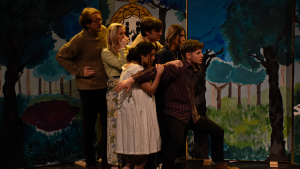Anna: There is something about this play, and this adaptation in particular, that feels very suited to our community, especially in this highly charged political moment.
You mentioned that “The Seagull” is set on a Russian estate that feels a lot like Kenyon. I’ve really considered that as a director, and I think for our production the fin-de-siécle part of Chekhov’s setting also feels incredibly relevant. In “The Seagull,” the location is idyllic but detached—the world is changing rapidly but affecting the estate very slowly. There’s this family of artists looking to respond to and reflect the world in meaningful ways. Ultimately, they have to ask themselves what the role of their work is in their culture, whether it can provide meaning to their lives, and to what extent it can actually change the shape of their society.
So much of this rings true to the experience of being a drama major at Kenyon during COVID. In a period of so much change, it sometimes feels a little silly to keep pushing to make beautiful plays. But the irony actually makes the work more significant.
At the very least, it forces us to choose plays that feel relevant and timely. I directed a production of Caryl Churchill’s “Far Away” last spring in the pine grove (with Sara as the lead) that responded to the climate crisis; Teddy worked on “Godspell” this fall and brought this very healing, playful tone to the process. Both productions dealt with lots of COVID restrictions (“Far Away'' was fully masked, even in performances). We had to pick pieces that really justified that effort.
It has been a huge gift to work on a play that directly engages with these big questions about the nature of art, but it’s also so wonderful that our adaptation is really a comedy, even as it is incredibly sad. I really respond to what you said about Chekhov’s dualities as a writer, and I think they come through in why this feels like the right piece for this moment. “SFB” allows us to laugh in this complex way—we don’t have to push aside our problems with the world. We can laugh at their absurdity, cry a little bit, and then face them with new eyes.
Beth, I would love to hear about how you think adaptations of Chekhov can/should respond to this moment. “Seagulls” looks amazing. I know it was written and performed pre-COVID–is there anything you’d shape differently in a version of it written for our world today?
Beth: Anna, I wish I could’ve seen “Far Away” in the Pine Grove, that sounds incredible! There’s something both very dark and very clarifying about being forced to ask if putting on any given play is worth the risks involved due to COVID–it really makes you think about whether what you’re doing is worth it, and worth it in what way, and to whom. Since theatres have been able to reopen, I’ve often been like, “Wait a minute, the first show you’re putting up after everything we’ve all been through during the past two years is “Forever Plaid’?” But then on the other hand, I also have to admit that I’ve been allergic to watching any art that deals with COVID directly–it just feels too close.
That’s actually something that’s both a blessing and a curse of theatre, I think: it just takes so long to produce a play, from the inception of the idea to finally getting it up onstage, that it’s not suited to immediate reactions. If you write something that’s super timely and of-the-moment, it’ll probably be four years until it’s produced (unless you put it up yourself in a really scrappy way), and it might feel totally dated by the time an audience sees it. There are ways in which this is really frustrating, but I also think the pause between writing and staging can give the gift of perspective. If I had to guess, I bet a lot of plays being produced four years from now will feature themes of isolation and upheaval from what we’re living through now.
To your question about writing a version of “Seagulls” today, I think the answer is that I really couldn’t (or wouldn’t want to). It’s so tied both to my college experience and to the younger version of myself who wrote it that I just want to let it sort of rest as a time capsule, flaws and all. But my most recent play is an adaptation of “Uncle Vanya” called “Fires, Ohio” that’s in large part about the climate crisis. Part of the inspiration for that came from re-reading “Vanya” and noticing that Astrov is an obsessive environmentalist–he just goes on and on and on about the beauty of the natural world and the evil humans do by destroying it. His characters constantly wonder about how people 100 years from now will see them and what the future will look like. In this case, he saw it eerily clearly.
Sara: I am playing Nina in “SFB” and I feel super connected to her. Something wonderful about Chekhov’s writing is how viscerally all of his characters are written, which in turn translates so beautifully and seamlessly to performance. As I am graduating in the spring, I feel very connected to Nina’s anxiety of feeling like she is searching for a break. I sometimes feel like I'm grasping at straws to be taken seriously…and so does she! I am also really excited about the ensemble aspect of Chekhov because Kenyon is such a community-oriented place.
What was your biggest struggle in your adaptation? Did you feel like you had to sacrifice anything in creating a cohesive adaption?

The Octagon Theatre Bolton performance of Seagulls, taken by "The Other Richard."
Beth: I love Nina so much, too, Sara! She is so special–although honestly I love all four of the younger characters so much that it’s impossible to pick a favorite.
One struggle that I had in adapting “The Seagull” initially was letting go of the need to be faithful to the original text. When I started, I felt like I needed to adapt fairly literally, almost page by page. Luckily, my director Rebecca Willingham encouraged me to focus on what I was interested in, and to break from the source text in whatever way I wanted. That opened up so many possibilities. It also allowed me to write a play that people can enjoy on its own merits without being familiar with Chekhov.
I completely hear you about looking for a break and trying to be taken seriously. I feel like people so often brush off the thoughts/feelings/concerns of younger people, and it’s kind of infuriating! I don’t know if any of you are experiencing this, but I remember feeling such a strong sense of impending doom during the last semester of my senior year–just pure terror about what I was going to do when I graduated and what my life was going to look like, mixed with so much sadness about how my time at Kenyon was coming to an end.
What are you all thinking/feeling/hoping about life after graduation? How do you imagine incorporating acting/theatre/art into your lives? Are you as sick of people asking you this question as I was when I was about to graduate?
Teddy: I absolutely relate to the sense of impending post-graduation doom. It is so crazy to think that this is the last play I’ll be doing that isn’t in the “real world” (or possibly the last play I’ll ever do? Hopefully not). I don’t think any of us knew this when we chose this play, but there is such a great connection between these anxieties of wanting to form a life around art and the themes explored in “SFB,” making it kind of a perfect play to do as drama students who are naturally worried about our futures.
Beth: I very much hope that this isn’t your last play (unless you want it to be). I’ve found since graduating from Kenyon that there are so many ways to incorporate your artistic practice into your life, and it doesn’t always have to be that you’re either a professional actor or you never act again. It’s been beautiful to see the ways the other drama majors in my graduating class have both followed their passions and discovered new ones since we graduated.


